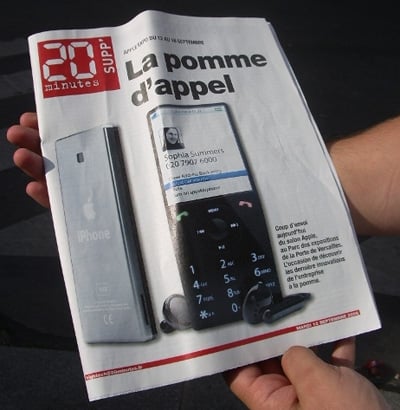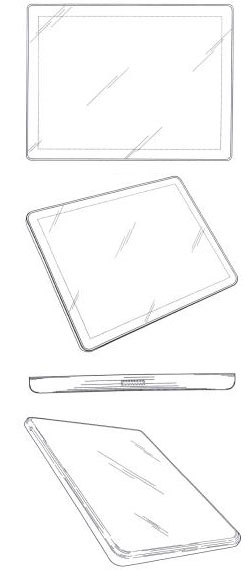This article is more than 1 year old
The life and times of Steven Paul Jobs
Empire-building inspirational visionary, or megalomaniacal swine?
iPhone, iPad
At this point in our retelling of the saga of the man who was eventually to be named the CEO of the Decade by Fortune magazine and immortalized in cheese, we're going to pick up the pace a bit.
During the past five years since the Intel transition was completed and the Pixar acquisition finalized, Jobs has become scrutinized from every angle, perspective, and viewpoint, and you, dear Reg reader, have been treated to well over a thousand articles on this website about him.
Unless you've been retracing Roald Engelbregt Gravning Amundsen's routes to both the North and South Poles for the past few years, you – as a savvy tech type – are likely familiar with Jobs' own route in the past five years. There's little more we could tell you than what you already know, so we'll just touch upon a few more matters – such as this little thing called the iPhone that you may have heard about.

Waiting in the iPhone line
(source: AppleInsider)
Despite its many detractors and its demonstrable flaws, the iPhone has been a monumental success. Its supporters describe it as further proof that Jobs was a visionary who understood what consumers wanted before those consumers did themselves. Its detractors point to it as a ho-hum device that confirms their suspicions that most consumers are easily seduced by shiny-shiny, and that Jobs was a megalomaniac interested only in herding "sheeple" into his walled garden.
Among the chattering geekerati, sides are taken, insults are hurled, tempers flare – over a phone? Yes, over a phone, albeit one that runs apps.
Steven Paul Jobs did that to people.
The iPhone started crazy. Even well before it was released, wacky speculation and rear-view-mirror shortsidedness ruled. On that last point, remember before its release the way many spoke of the iPhone as being essentially an iPod that made phone calls?
Of the well over four thousand Reg articles that contain the word "iPhone", nearly two hundred were written before the damn thing even shipped. In 2002, for example, we reported a rumored "iPhone" – yes, that's the term we used – being developed in an Apple-Sony partnership. More rumors cropped up in 2004, with Apple's suspected iPhone partner being Motorola, and in 2006, with the partner being Japan's SoftBank. That year also saw a rather off-the-mark French magazine cover that featured the purported iPhone.

Ceci n'est pas une iPhone (with apologies to Magritte)
There were the rumors that the iPhone would have a slider form-factor, and that Apple would provide service for it and Motorola's "iPod phone", the ROKR (aka the LOZR), by becoming an MVNO (mobile virtual network operator). One analyst confidently predicted that "the new phone's design will be similar to that of the [first-generation] iPod Nano, and is likely to come in three colors: white, black, and platinum".
Industry observers lined up to judge the iPhone even before Jobs unveiled it on January 9, 2007, at Macworld Expo in San Francisco. That December, for example, one Reggie wrote: "As customers start to realise that the competition offers better functionality at a lower price ... sales will stagnate. ... The only question remaining is if, when the iPod phone fails, it will take the iPod with it."
Well, history has proved that the "iPod phone" did, indeed, lead to the decline of the iPod – but not in the way that our usually clear-headed colleague imagined.
Another Reg writer was kinder, reminding readers on the day after the iPhone's unveiling that Apple's Mac was successful only after it cornered the desktop publishing market. "Apple will be hoping the iPhone can similarly find some unexpected niche," he wrote. "It deserves to be far more than a US-only phenomenon."
Perhaps the most well-known dissing of the iPhone was by Microsoft CEO Steve Ballmer, who famously guffawed in a video interview: "Five hundred dollars? Fully subsidized? With a plan? I said, 'That is the most expensive phone in the world!' And it doesn't appeal to business customers because it doesn't have a keyboard, which makes it not a very good email machine."
(We can't resist relating a recent comment to that YouTube video: "i watched this on my iphone so fuck you ballmer".)

2004 Apple patent illustration
Reality check: Apple sold 128.4 million iPhones through June 2011. It will report sales through September on October 18, and there's little evidence that they nosedived in anticipation of the recently announced iPhone 4S, and Apple seems poised to ship a goodly number of them during the holiday season.
And speaking of the holiday season, the iPhone's larger, younger brother, the iPad, should also have a good next couple of months. The beancounters at Gartner, citing the fact that "Apple delivers a superior and unified user experience across its hardware, software and services," project that Apple will sell about 46.7 million of the fondleslabs during all of 2011. And 69 million in 2012. And 149 million in 2015.
It seems Jobs was right about that one, as well. It may have driven technically astute observers crazy when he cooed that his "magical and revolutionary" iPad was the "most important product" that he had ever worked on, but it's hard to argue that fact that the iPad essentially invented an entirely new category of products.
Well, it's hard to argue unless you're Bill Gates, who in a video interview with The Boston Globe said: "Tablet computing is an innovation where Microsoft has been ahead every step of the way. So if you want to look at tablets, and touchscreens, and how students use those – that's a Windows phenomenon."
That's the type of argument that might hold up in an IP battle, but not in the court of public opinion.
The iPad, like the iPhone, went through a long gestation period in the tummy of the rumor mill. As we pointed out after one such rumor surfaced in January 2009, "tablet Mac" rumors had appeared as early as November 2002, and kept right on bubbling along until the iPad was formally announced by Jobs on January 27 of last year.
At that announcement, Jobs noted that Apple had "pondered [the] question for years" as to whether a device that would occupy the space between a laptop and a phone made sense, so it's entirely possible that some of the tablet rumors that cropped up every so often were based on fact.
It's equally possible that Jobs surreptitiously floated some of them out into the rumor-sphere to gauge market interest. We may never know.
